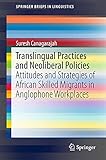Translingual Practices and Neoliberal Policies [electronic resource] : Attitudes and Strategies of African Skilled Migrants in Anglophone Workplaces / by Suresh Canagarajah.
Material type: TextSeries: SpringerBriefs in LinguisticsPublisher: Cham : Springer International Publishing : Imprint: Springer, 2017Description: VII, 66 p. online resourceContent type: text Media type: computer Carrier type: online resourceISBN: 9783319412436Subject(s): Education | Language policy | Educational policy | ducation and state | Emigration and immigration | Education | Educational Policy and Politics | Language Policy and Planning | MigrationAdditional physical formats: Printed edition:: No titleDDC classification: 379 LOC classification: LC8-6691Online resources: e-book Full-text access
TextSeries: SpringerBriefs in LinguisticsPublisher: Cham : Springer International Publishing : Imprint: Springer, 2017Description: VII, 66 p. online resourceContent type: text Media type: computer Carrier type: online resourceISBN: 9783319412436Subject(s): Education | Language policy | Educational policy | ducation and state | Emigration and immigration | Education | Educational Policy and Politics | Language Policy and Planning | MigrationAdditional physical formats: Printed edition:: No titleDDC classification: 379 LOC classification: LC8-6691Online resources: e-book Full-text access | Item type | Current library | Collection | Call number | Copy number | Status | Notes | Date due | Barcode |
|---|---|---|---|---|---|---|---|---|
| E-Books | MEF eKitap Kütüphanesi | Springer Nature | LC8 -6691 (Browse shelf (Opens below)) | Available | NATURE | 1419823-1001 |
Introduction -- Critical discussion -- Neoliberal orientation to language -- Comparing neoliberalism with translingual practice -- Language policy and practice in skilled migration -- Pedagogical implications.
This book responds to recent criticisms that the research and theorization of multilingualism on the part of applied linguists are in collusion with neoliberal policies and economic interests. While acknowledging that neoliberal agencies can appropriate diverse languages and language practices, including resources and dispositions theorized by scholars of multilingualism, it argues that a distinction must be made between the different language ideologies informing communicative practices. Those of neoliberal agencies are motivated by distinct ideological orientations that diverge from the theorization of multilingual practices by critical applied linguists. In addressing this issue, the book draws on the author's empirical research on skilled migration to demonstrate how sub-Saharan African professionals in English-dominant workplaces in the UK, USA, Australia, and South Africa resist the neoliberal communicative expectations and employ alternate practices informed by critical dispositions. These practices have the potential to transform neoliberal orientations on material development. The book labels the latter as informed by a postcolonial language ideology, to distinguish them from those of neoliberalism. While neoliberal agencies approach languages as being instrumental for profit-making purposes, the author's informants focus on the synergy between languages to generate new meanings and norms, which are strategically negotiated in pursuit of ethical interests, inclusive interactions, and holistic ecological development. As such, the book clearly illustrates that the way critical scholars and multilinguals relate to language diversity is different from the way neoliberal policies and agencies use multilingualism for their own purposes.
5
